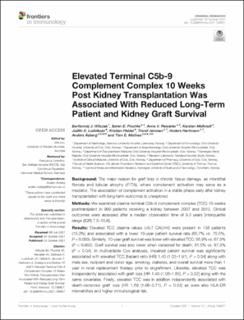| dc.description.abstract | Background: The major reason for graft loss is chronic tissue damage, as interstitial fibrosis and tubular atrophy (IF/TA), where complement activation may serve as a mediator. The association of complement activation in a stable phase early after kidney transplantation with long-term outcomes is unexplored.
Methods: We examined plasma terminal C5b-9 complement complex (TCC) 10 weeks posttransplant in 900 patients receiving a kidney between 2007 and 2012. Clinical outcomes were assessed after a median observation time of 9.3 years [interquartile range (IQR) 7.5–10.6].
Results: Elevated TCC plasma values (≥0.7 CAU/ml) were present in 138 patients (15.3%) and associated with a lower 10-year patient survival rate (65.7% vs. 75.5%, P < 0.003). Similarly, 10-year graft survival was lower with elevated TCC; 56.9% vs. 67.3% (P < 0.002). Graft survival was also lower when censored for death; 81.5% vs. 87.3% (P = 0.04). In multivariable Cox analyses, impaired patient survival was significantly associated with elevated TCC [hazard ratio (HR) 1.40 (1.02–1.91), P = 0.04] along with male sex, recipient and donor age, smoking, diabetes, and overall survival more than 1 year in renal replacement therapy prior to engraftment. Likewise, elevated TCC was independently associated with graft loss [HR 1.40 (1.06–1.85), P = 0.02] along with the same covariates. Finally, elevated TCC was in addition independently associated with death-censored graft loss [HR 1.69 (1.06–2.71), P = 0.03] as were also HLA-DR mismatches and higher immunological risk.
Conclusions: Early complement activation, assessed by plasma TCC, was associated with impaired long-term patient and graft survival. | en_US |

